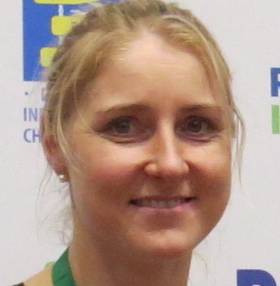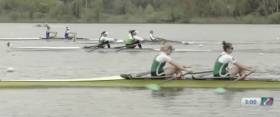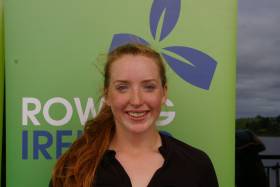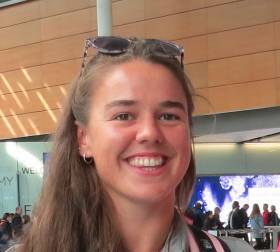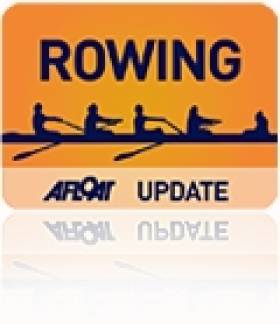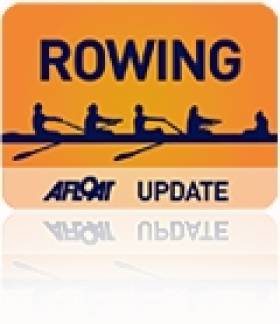Displaying items by tag: Memorial Paolo d'Aloja
Ireland Rowers On Pace but Out of Medals in Italy
#Rowing: Ireland crews contended in four A Finals on Sunday in the Memorial Paolo d’Aloja in Italy. There were two close-up fourth places: the lightweight men’s double of Jake McCarthy and Fintan McCarthy lost bronze to Portugal in the closing stages of their race, while the novel four of Tara Hanlon, Sanita Puspure, Aifric Keogh and Monika Dukarska fought to prevent a 1-2-3 of Romania crews in their race but missed out. The four of Claire Feerick, Emily Hegarty, Aileen Crowley and Claire Lambe were fifth.
Philip Doyle and Ronan Byrne were on the pace in the men’s double, but finished fifth, while Cliodna Nolan and Lydia Heaphy took sixth in the lightweight women’s double sculls.
Memorial Paolo d’Aloja, Piediluco, Italy, Finals (Irish results; selected)
Saturday
Men
Double – A Final: 3 P Doyle, R Byrne 6:33.90.
Lightweight Double Sculls – A Final: 3 F McCarthy, J McCarthy 6:38.43.
Women
Pair – A Final: 5 A Keogh, M Dukarska 7:33.3; 7 A Crowley, E Hegarty 7:42.36. B Final: 3 C Feerick, E Lambe 7:45.41.
Lightweight Double – A Final: 6 C Nolan, L Heaphy 7:48.91.
Single – A Final: 1 S Puspure 7:58.89.
Sunday
Men
Double Sculls – A Final: 5 P Doyle, R Byrne 6:41.56.
Lightweight Double Sculls – A Final: 4 F McCarthy, J McCarthy 6:45.55.
Women
Four – A Final: 4 T Hanlon, S Puspure, A Keogh, M Dukarska 7:05.53; 5 C Feerick, E Hegarty, A Crowley, E Lambe 7:06.98.
Lightweight Double Sculls – A Final: 6 C Nolan, L Heaphy 7:57.33.
Gold for Puspure and Bronze for Ireland Doubles in Italy
#Rowing: Sanita Puspure and two Ireland men’s crews took medals on the first day of the Memorial Paolo d’Aloja in Italy today. Puspure is world champion in the single sculls and she continued her run with a good win.
The men’s double of Ronan Byrne and Philip Doyle were another success story from the World Championships in 2018 – they finished ninth. They took third place in their A Final, which was won by Romania.
The bronze medal for Jake and Fintan McCarthy came in a lightweight doubles final won by Italy, with Belgium second – these crews took silver and bronze at last year’s World Championships.
The Ireland pairs of Aifric Keogh and Monika Dukarska and Aileen Crowley and Emily Hegarty took fifth and seventh in their final.
Lough Rinn Grand League Regatta, scheduled for tomorrow (Sunday), has been cancelled. The organisers had hoped to hold the event, and told clubs that some racing would not go ahead. But after receiving a forecast from Met Éireann of a powerful, gusting wind, they changed their decision.
Memorial Paolo d’Aloja, Piediluco, Italy, Saturday Finals (Irish results; selected)
Men
Double – A Final: 3 P Doyle, R Byrne 6:33.90.
Lightweight Double Sculls – A Final: 3 F McCarthy, J McCarthy 6:38.43.
Women
Pair – A Final: 5 A Keogh, M Dukarska 7:33.3; 7 A Crowley, E Hegarty 7:42.36. B Final: 3 C Feerick, E Lambe 7:45.41.
Lightweight Double – A Final: 6 C Nolan, L Heaphy 7:48.91.
Single – A Final: 1 S Puspure 7:58.89.
Puspure and Dukarska Team Up to Take Sculling Bronze
#Rowing: Sanita Puspure and Monika Dukarska teamed up in a double to take a bronze medal at the Memorial Paolo d’Aloja in Italy today. The Ireland crew led early on and stayed in the mix as Lithuania took over the lead. In a dash for the line, Ireland and South Africa fought it out for silver, with the South Africans just taking it.
Ireland had earlier taken a medal in the single sculls through Emily Hegarty, who also took bronze.
Memorial Paolo d’Aloja International Regatta, Piediluco, Italy (Irish interest)
Sunday
Women
Double Sculls – A Final: 1 Lithuania 7:07.04, 2 South Africa 7:09.36, 3 Ireland (S Puspure, M Dukarska) 7:09.88.
Single Sculls – A Final: 1 Ukraine (D Dymchenko) 7:52.35, 2 Lithuania (L Saltyte) 8:11.90, 3 Ireland (E Hegarty) 8:14.76.
Hegarty (19) Takes Bronze Medal at International Rowing Regatta
#Rowing: Emily Hegarty took a bronze medal at the Memorial Paolo d’Aloja international regatta in Piediluco in Italy this morning. The UCC woman, who is 19, showed great belief in herself to take third place and hold it in a race dominated by Diana Dymchenko of the Ukraine. Lina Saltyte of Lithuania, an established international, took the silver.
Memorial Paolo d’Aloja International Regatta, Piediluco, Italy (Irish interest)
Sunday
Women
Single Sculls – A Final: 1 Ukraine (D Dymchenko) 7:52.35, 2 Lithuania (L Saltyte) 8:11.90, 3 Ireland (E Hegarty) 8:14.76.
Puspure Wins Single Sculls Heat in Italy
#Rowing: Sanita Puspure won her heat of the single sculls at the Memorial Paolo d’Aloja regatta in Italy, qualifying for Saturday’s A Final. The Ireland sculler had over a second to spare over second-placed Milda Valciukaite of Lithuania, an Olympic bronze medallist in the double in 2016. Emily Hegarty and Aifric Keogh qualified for the A Final of the pair with third in their heat, while Monika Dukarska and Aileen Crowley won a three-boat exhibition race in the women’s double.
Kennedy and Dukarska Take Rowing Gold Again
#ROWING – Ireland's Leonora Kennedy and Monika Dukarska won gold for the second day running at the Memorial Paolo d'Aloja regatta in Piediluco in Italy. The Enniskillen/Killorglin pair have only come together as a crew in recent weeks, but again proved faster than Spain and Italy crews.
The lightweight women's double of Claire Lambe and Denise Walsh competed with the heavyweight crews and finished fifth.
The Ireland men's lightweight double missed out on the final: they raced well on Saturday evening but finished third behind South Africa, the world champions, Greece.
Memorial Paolo d'Aloja Regatta, Piediluco, (A Finals unless stated; Irish interest)
Saturday
Women
Pair: 1 Ireland (L Kennedy, M Dukarska) 7:35.74, 2 Spain 7:37.11, 3 Italy Two 7:38.79.
Lightweight Double Sculls: 1 South Africa 7:11.05, 2 Italy 7:17.41, 3 Ireland (C Lambe, D Walsh) 7:18.97.
Single Sculls: 1 Switzerland (J Gmelin) 7:56.63, 2 Greece Two (A Asoumanaki) 7:57.42, 3 Zimbabwe (M Thornycroft) 7:58.40; 4 Ireland (S Puspure) 8:01.67.
Lightweight Single Sculls: 1 Switzerland (P Merz) 7:46.88, 2 South Africa (K Johnstone) 7:49.80, 3 Switzerland Two (R Frederique) 7:20.25; 4 Ireland (S McCrohan) 7:50.35.
Saturday Heats
Men
Lightweight Double – Heat Three: 1 South Africa 6:24.87, 2 Greece 6:25.40, 3 Ireland (P O'Donovan, G O'Donovan) 6:26.49
Women
Lightweight Single Scull – Heat One: 2 McCrohan 8:17.38.
Sunday – Finals
Women
Pair: 1 Ireland (Kennedy, Dukarska) 7:31.65, 2 Spain 7:32.49, 3 Italy Two 7:35.41.
Double Sculls: 1 Lithuania (D Vistartaite, M Valciukaite) 7:01.59; 5 Ireland (Lambe, Walsh) 7:26.33.
Olympic Rower Puspure Makes Final on Return to Action
#ROWING: Sanita Puspure finished second in her heat and qualified for tomorrow’s single sculls final at the Memorial Paolo d’Aloja regatta in Italy. The Ireland Olympian clocked seven minutes 41 seconds, seven seconds behind the winning time, on her return to action after a season ruined by illness. Puspure was Ireland’s sole rower at the 2012 Olympics. She finished 13th.



























